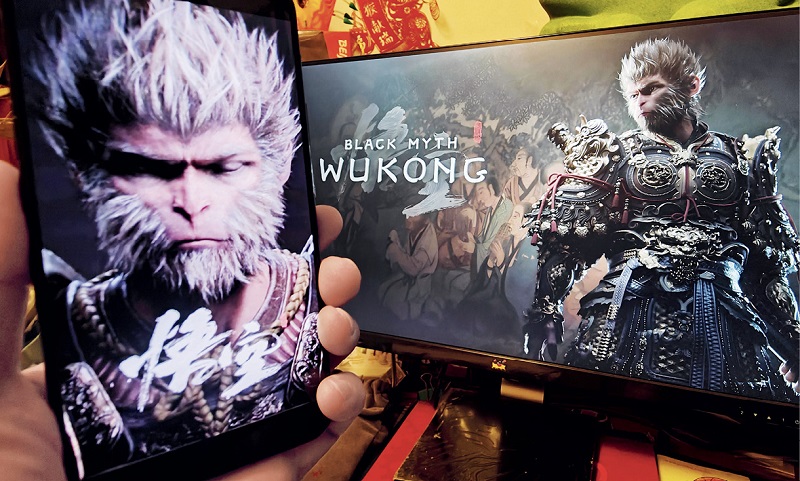
Black Myth: Wukong is based on the story of Monkey King or Sun Wukong, an iconic character in the Chinese classic novel Journey to the West.
American YouTuber Andrew Sarran, a well-known figure on social media for his videos on mythology, has an eclectic taste. Using the handle “The Mythology Guy,” he has made short videos on films, TV shows and video games based on the myths and legends of northern Europe, Greece, India, Japan, China and farther. His current favorite is Black Myth: Wukong, China’s blockbuster video game based on a much-loved classic that has become a top seller globally since its release in August.
Black Myth: Wukong is the top game on Steam, the world’s largest digital game platform, with glowing reviews by 93 percent of English-speaking players and 96 percent Chinese ones. One month after its launch, according to statistics from market research organization Video Game Insights, its sales approached 21 million sets on Steam, grossing more than US $1 billion.

To attract more consumers, computer products are sold together with the Chinese role-playing game Black Myth: Wukong at a shopping mall in Hong Kong on August 28, 2024.
Message Behind Myths
Sarran’s own videos on the game have also gone viral. They are reaction videos, a genre in which one or more people record themselves watching something, usually a new release that has hit the headlines. The videos combine clips from the original show and Sarran and others’ reactions to it.
The audience is thrust into the heat of battle in the very opening scene of Black Myth: Wukong. The eponymous protagonist of the game is Sun Wukong or the Monkey King, a human-like monkey with supernatural powers who escorts a revered monk to the West to keep him safe while acquiring Buddhist literature, as depicted in the 16th-century novel attributed to Wu Cheng’en. In the scene Wukong faces the three-eyed warrior-god Erlang resolutely, gripping the jin gu bang, his magic staff weighing eight tonnes. Though Erlang’s ax can cleave entire mountains into two, Wukong never flinches.
“The gameplay is very unique, as the protagonist masters the 72 transformations,” said Sarran, who seems to know every detail of the game, which enables him to explain the story behind the game to his viewers so cogently. He has a long acquaintance with myths and legends, including Chinese ones. His mother is from Georgia, the East European country which shares many cultural links with Greece, and many Greek myths have a connection to the region. “The Georgians are proud of this cultural tradition,” he said.
Also, at the age of eight he watched Jackie Chan Adventures, the cartoon series in which Chan, the beloved martial arts star, is an archaeologist and special agent who demolishes magical and supernatural villains based on mythologies and supernatural stories from Asia and around the world. The series taught Sarran the Chinese zodiac, and started his exploration of Chinese culture. When he came across the story of the Monkey King, he found it uber-cool. In Wu’s classic Journey to the West, Sun Wukong the fearless jumped out of a stone, accompanied Buddhist monk Tang Sanzang to obtain Buddhist scriptures in the West, and eventually became a Buddha. The fantastic story made Sarran feel that everyone can achieve their goals with dedication, no matter what their origin is.
He devoured the four-volume Journey to the West, then its comic book version, and then watched the Netflix movie The Monkey King. He found that while many Americans are familiar with Greek and Nordic myths, they know little about Chinese myths. So he started to shoot short videos about Chinese myths in 2020 and put them on TikTok. In this way household myths in China like that of the Eight Immortals – ordinary people, including a beggar, who achieved immortality and enlightenment, and how the order of the 12 animals was established in the zodiac became popular among young Westerners.

A player displays the promotional poster for Black Myth: Wukong in Shanghai, on August 21, 2024.
Culture Without Borders
Black Myth: Wukong is a stand-alone action role-playing game developed by video game developer Game Science based in Shenzhen in south China. In industry lingo, it is an “AAA” game – a label that denotes big budgets and high production value. It made overseas players so interested in the story that many bought the book to navigate the complicated labyrinth of legends.
“My friends started to borrow (my copy of) The Journey to the West from me,” Sarran said. For those who have no time to read the book or get it, Sarran’s reaction video is a godsend to understand the background. So it has become a must-watch for veteran players.
The game made enthusiasts start commenting on social media. Some remembered The Journey to the West TV series, a collection of 25 episodes that aired on CCTV in 1986. Some said it made them realize that Son Goku, the protagonist of Dragon Ball, the popular Japanese anime TV series in the 1980s, was inspired by Wukong, including his power of transformation and the Flying Nimbus, the magical yellow cloud that he used for transportation.
“The game’s music is fantastic too,” said Sarran, who described it as “ear candy.” “When fighting against mighty enemies, the powerful music boosts my morale and makes me feel invincible,” he said.
Music has no borders. When Sarran’s reaction video plays the clip from the game with the “Rebirth Mantra” soundtrack, Buddhist chants about the cycle of life and rebirth rendered in a cyberpunk style, or “Namo Amitābha,” a tribute to the Buddha, in the electronic rock style, players across the globe look stunned at this versatility and universality of Chinese music.
The game designs are also steeped in Chinese culture. The scenes extensively replicate ancient Chinese architecture and icons, such as the Buddhist stupas and kungfu. The game developers scanned many places of historical and scenic interest in China and presented them in the game to give players an immersive and realistic experience.
Some enthusiastic players found a series of promotional videos for Black Myth: Wukong on TikTok released by the Culture and Tourism Department of Shanxi Province, showcasing many of the game’s real-life filming locations, including famous cultural landmarks such as the Xiaoxitian Temple, (or the Temple of One Thousand Buddhas) built in the 17th century, famous for its exquisite hanging sculptures.
Black Myth: Wukong has put China on the global map of gaming just as Liu Cixin’s 2008 science trilogy The Three-Body Problem did for science fiction emerging from China, and The Wandering Earth, the 2019 sci-fi film based on a novella by Liu, did for Chinese sci-fi films. And well-informed watchers like Sarran have helped drive this progress.
More catalyst is expected in the future as Feng Ji, founder and CEO of Game Science, said that Black Myth: Wukong is the first offering in the series, meaning more will follow. Feng promised the Black Myth series will be a series of magical stories about different legendary heroes in the oriental myth system, and Wukong is the starting point. “In the future, there will be more Chinese games that can compete globally,” he said.

Game screens of Black Myth: Wukong.